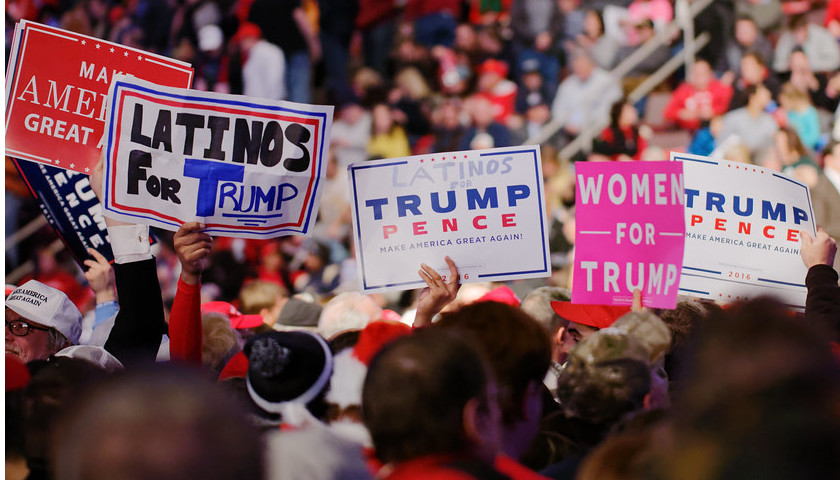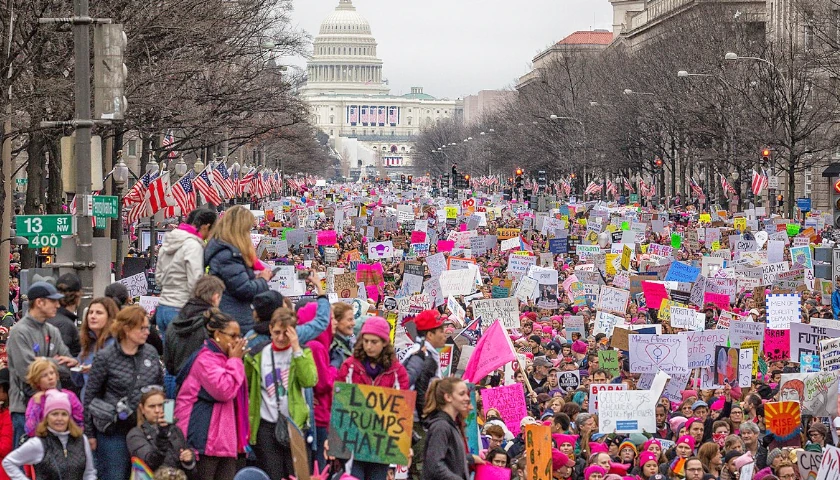by José Niño
In expected 13 percent of the electorate in the 2020 elections, American Hispanics are likely to play a crucial role in deciding contests in Arizona, Florida, and Texas. As the country’s Hispanic population grows larger, many wonder how Republicans can bring this demographic into their fold. Given that the Republican Party has dedicated a good portion of its resources to addressing this question, it’s impossible to say they’ve been ignoring Hispanics. But have they been effective?
A sober analysis of these outreach efforts shows that the GOP still has much work to do.
In 2016, President Trump received 29 percent of the Hispanic vote, which represented a two percentage point increase over Mitt Romney’s performance in 2012. Trump was able to receive an uptick in Hispanic votes despite running on a hawkish immigration platform that called for cracking down on illegal immigration and restricting legal immigration. The media was utterly convinced that Trump’s support among Hispanics would crater because of his positions on these issues, but it turns out that immigration wasn’t really a deal-breaker for Hispanic voters. Many Hispanics, in fact, share Trump’s views on the question.
Democrats received a solid percentage of the Hispanic vote in the 2018 midterms with roughly 69 percent of Hispanics pulling the lever for Democratic candidates. On the other hand, Republicans could only count on 29 percent of Hispanics voting for them in the 2018 cycle. There were some bright spots, however, in gubernatorial races. In Arizona, Florida, and Texas, Republican governors Greg Abbott, Ron DeSantis, and Doug Ducey nabbed 42 percent, 44 percent, and 44 percent of the Hispanic vote, respectively.
Even so, the GOP still has significant room for improvement in order to win over Hispanic voters. Heading into the 2020 elections, Republicans have some reasons to be optimistic about their electoral prospects among Hispanic voters. Domenico Montanaro of NPR recently illustrated this trend by noting “the one group Biden continues to underperform with slightly is Latinos—59 percent of Latinos said they’d vote for Biden over Trump, but Clinton won 66 percent of their votes in 2016.”
The good news is that the Hispanic population’s diverse, ethnolinguistic background prevents them from becoming a monolithic voting bloc. It’s worth bearing in mind that if these numbers continue to hold as the Hispanic population grows—Unidos US projections have Hispanics reaching a quarter of the American population by 2040—the Republican party will become electorally irrelevant if they don’t address the concerns of Hispanic voters.
To prevent a prolonged electoral winter, the GOP will need to become active on several fronts with the Hispanic community. And it can do so by honing in on national populist policies.
Take Up the Law and Order Mantle
First up is a firm law and order message. As American cities across the nation burn thanks to the dereliction of duty on the part of public officials and the hostility of unruly mobs, millions of Americans are clamoring for order. Hispanic Democrats, surprisingly, are one constituency that has grown tired of the radical Left’s antics on the streets.
According to an ABC News/Ipsos poll conducted from June 3-4, 54 percent of Hispanic Democrats supported sending in the military to bring back order to the streets during the George Floyd riots. 60 percent of all Hispanics supported some form of military presence.
Such support for a resounding response against vandals is logical when taking into account Hispanics’ shared experiences. Hispanics generally come from countries marked by rampant crime and a good portion of them do not want the United States to become a facsimile of the chaotic countries they fled. Such scenes are traumatic to them. We’ve already witnessed certain gangs, such as the Latin Kings, take matters into their own hands in cities like Chicago to protect businesses from looters.
Nature abhors a vacuum, and when the police can’t bring order, criminal elements will step in to fill in the void. Allowing criminals to occupy the role that police traditionally have held is likely to prove harmful, given the Latin Kings’ reputation for committing high-profile crimes such as racketeering and drug trafficking. But if local authorities can’t reassert themselves and fulfill their functions, criminal elements will become more emboldened and potentially create failed state scenarios that are not too dissimilar from what is taking place in countries such as Mexico. Common-sense policing and a restoration of order are simple steps towards fixing these problems and reassuring Hispanic voters.
Tackle Immigration Head-On
Another way the GOP can make even greater inroads with Hispanics is by cutting mass migration—both legal and illegal. They should draw inspiration from the example of famed labor activist Cesar Chavez.
The Hispanic labor leader made his name by standing up against illegal immigrant labor that undercuts American farmworkers. His United Farm Workers Union was able to build a multi-ethnic coalition of workers who resisted the agricultural industry’s use of illegal immigration to break strikes and depress wages. In its efforts, the UFW was able to act as an effective surrogate to the now-defunct Immigration and Naturalization Service (INS) in cracking down on illegal immigration.
We can safely ignore the media’s hyperbolic take on immigration. Again, President Trump did not lose but rather gained Hispanic support when he ran in 2016. In light of the coronavirus-related shutdowns, 69 percent of Hispanics support pausing almost all immigration, according to a Washington Post and University of Maryland poll conducted in late April. No matter what the pundit class says, Hispanics who are here legally and can vote in our elections want some form of immigration restriction.
Ultimately, there will need to be an immigration timeout to allow for immigration assimilation and integration into society. Under a proper immigration pause, Hispanics and other immigrant groups will be able to assimilate while having their wages stabilize as they no longer have to worry about competing against never-ending pools of cheap foreign labor. That way, they can sustain themselves and their families without having to rely on public assistance (which Democrats are more than happy to get them hooked on) to get by.
The good news is that we have the 1920s as a guide for what this might look like. It’s only fitting that as the centennial of these immigration restrictions approaches, we revive serious discussions about cutting off further unnecessary immigration. These reforms signed into law by then-President Calvin Coolidge helped create an economically stable working class that would eventually form the backbone of America’s robust economy in the 20th century.
By pursuing a national populist agenda as opposed to engaging in cringe-inducing “Hispandering,” the GOP could make significant progress with Hispanic voters. The burden is on Republican leaders. The question is whether they are ready to capitalize on this opportunity.
– – –
José Niño is a Venezuelan American freelance writer.





